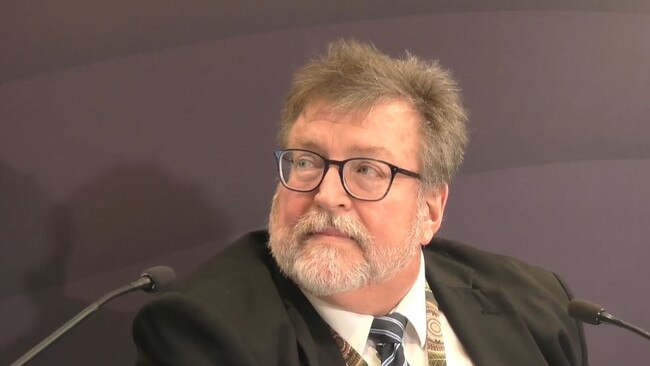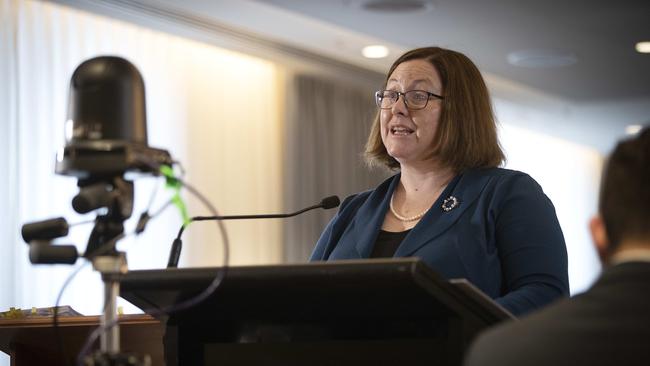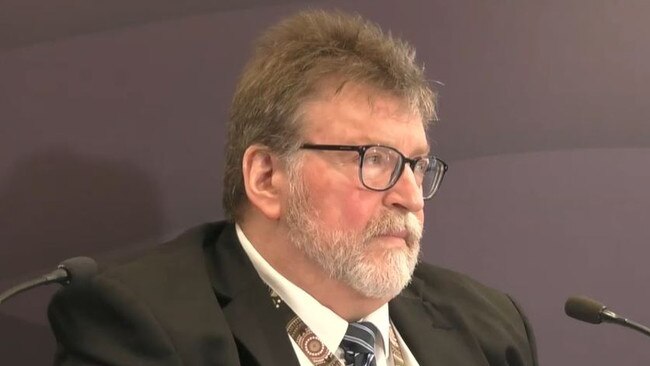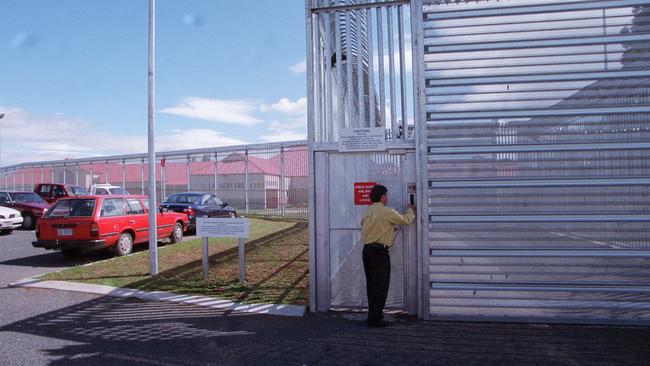Analysis: Apologies aren’t enough. Ashley Youth Detention Centre needs to be shut down now.
Over the past week and a half, we’ve heard about horrific cases of rape, isolation, beatings and “torture” at the Ashley Youth Detention Centre. Apologies are nice – but why is the government in no urgency to shut it down? ANALYSIS >
Tasmania
Don't miss out on the headlines from Tasmania. Followed categories will be added to My News.
AN APOLOGY is just words if it isn’t accompanied by action.
On Friday, we heard the latest in a series of carefully-worded apologies over Tasmania’s child sexual abuse crisis.
This time, it was from the man with ultimate oversight of the awful Ashley Youth Detention Centre – where children have been molested and beaten for decades.
“I sincerely apologise to each and every young person that Tasmanian government departments did not provide safe and secure care for at Ashley,” Department of Communities secretary Michael Pervan said to the child sexual abuse commission of inquiry.
“I also acknowledge that your pain will be lifelong, that the abuse impacts who you are, who you wanted to be and how you feel about yourself and others.
“That pain is lifelong and I deeply regret it.”
Hopefully, that apology – along with the others we’ve seen from the heads of Tasmania Police, the Department of Health and the Child Safety Service – will provide some comfort to those who were victimised at the hellhole that is Ashley.
But Tasmania’s children and young people need a hell of a lot more than words.
When Mr Pervan was questioned about how far plans had proceeded in Ashley’s closure, his answers were vague.
He said the three years to close Ashley – as announced by former Premier Peter Gutwein – were “very, very ambitious”.
He said the project team had been “working very diligently”, but that key staff had been on leave, and had been “tied up with operational matters” and in preparing evidence for the commission.
Mr Pervan said it was possible the three-year timeframe to close Ashley wouldn’t be met, although “that’s not what we’re planning on”.

This was astounding to hear.
We’re talking about a government that has known for 20 years – through various reports that have all said much the same thing – that Ashley is not fit for purpose.
This government has known for decades that children have been sexually abused there, that young people have been subjected to violence and “inhumane and degrading conditions” within its walls.
Over the past week and a half, we’ve heard of detainees being forced to give guards oral sex to receive their medication. We’ve heard of residents being put into what was known as a “gladiator pit” to fight each other. We’ve heard of brutal, degrading and ad hoc strip searches and cavity searches. We’ve heard of one girl who was sexually assaulted so much in the centre that she was put on contraceptives. We’ve heard of kids being bashed senseless by youth workers, and held in isolation cells for days with nothing more than a horse blanket.
To ignore this, to act like there are three years available to transition these kids out of Ashley, seems wilfully ignorant.
And yet there is still no official closing date.
In her closing address on Friday, counsel assisting the commission, Rachel Ellyard, said Tasmania’s government needed to act now.

“There appears to be a lack of urgency from the government to change the situation for these children, nearly all of whom are on remand,” she said.
“A failure to act now and implement a transition plan before Ashley’s closure will see children continue to be subjected to inhumane and degrading conditions and continue to be at risk of child sexual abuse.”
With the Ashley hearings now concluded, the commission of inquiry will return on September 7.
Alleged paedophile left Ashley on his own terms with lump sum
A LONGSERVING Ashley Youth Detention Centre employee was accused of sexually abusing at least four detainees – and stood down at least six times – but ultimately left the centre years later “on his own terms” and with a lump sum payout.
The employee, who was given the pseudonym “Walter” by the child sexual abuse commission of inquiry on Friday, didn’t leave his role at Ashley until 2017.
Walter worked at both the Ashley Youth Detention Centre and its predecessor, the Ashley Home for Boys, which was operational until 1999.
Michael Pervan, the secretary of the Department of Communities, agreed under questioning that Walter remained employed by Ashley “for years” even though at least four detainees having been paid sums of money after claiming that Walter had sexually abused them.
Those payments were made under Tasmania’s Abuse in State Care compensation scheme, which operated between July 2003 and February 2013.
Counsel assisting the commission, Rachel Ellyard said the claims were made for alleged abuse in 2008 and 2010, and that Walter continued working at Ashley until 2017.
Mr Pervan agreed “nothing was done with that information”, with the abuse allegations remaining “utterly unknown” to Walter’s supervisors and the hierarchy above him at Ashley.
Ms Ellyard said at the same time that was occurring, Walter was accused of multiple sexual or physical abuse allegations against detainees – and at one stage was criminally charged but later acquitted.
Mr Pervan agreed Walter was stood down at least six times during his employment during the investigations, but “on each occasion he was reinstated”.

About the same time, Ms Ellyard continued, Walter made a number of sick leave or WorkCover claims that at least to some extent lined up with when he was the subject of misconduct allegations.
“The ultimate aftermath of all of this is that his employment ultimately came to an end by agreement between him and the department, pursuant to him receiving a lump sum arising from claims that he had made,” she said.
“He ultimately left on his own terms.”
Mr Pervan agreed this happened with “no reference anywhere in the documentation” about the multiple allegations had been made against him.
He said Walter’s case was a “system failure” and agreed that because information wasn’t made available, it was a lost opportunity to protect children entering Ashley “from the risk that he may have posed to them”.
Mr Pervan said the department had been limited in what it could do under the state government’s “ED5” process – an employment direction under which code of conduct investigations, including child sexual abuse claims are conducted.
He said there was a “general understanding” that passing on information about a person’s previous allegation to an investigator required written consent from the accused person.
Mr Pervan also said about three weeks ago, an allegation from the commission of inquiry was forwarded to the department “on a Saturday afternoon” – with an ED5 process started and the person “asked to leave the workplace on Monday”.
‘Missed opportunity’: Police notified of alleged paedophile
TASMANIA Police was first notified about an alleged paedophile who worked at Ashley Youth Detention Centre in 2012 – some eight years before he was ultimately stood down.
On Wednesday, Tasmania Police assistant commissioner Jonathan Higgins spoke to the child sexual abuse commission of inquiry about Ashley employee Lester*, who was stood down in late 2020 over an historic child sexual abuse allegation.
Counsel assisting the commission Maree Norton pointed out that Tasmania Police didn’t receive a notification about Lester until November 2020 – a delay of 10 months after the Department of Communities had been alerted by whistleblower Alysha.
She said Lester continued working at the centre in that time, albeit on alternative duties.
Assistant Commissioner Higgins said in criminal matters like this, the “preference would be to refer it to the police”.
Ms Norton said there was a report to police as early as November 2012 about Lester having committed sexual abuse.
She said this report did not come from an Ashley detainee, and in a statement said they were “unsure if they wanted to proceed to court proceedings”.
An intelligence submission said “its reliability can’t be judged, but probably true”, Ms Norton added.

“The person who’s made the complaint, although he’s complaining about sexual offending in respect of himself, he also refers to being concerned because Lester works at Ashley Youth Detention Centre,” she said.
“They were clearly concerned about the risk Lester posed to children and young people at the centre.”
Assistant commissioner Higgins said the standard practice by police would have been to make contact with the department to “pass on concerns raised”.
He said he didn’t know if that had happened in this case, but agreed it may have been a “missed opportunity” to raise concerns with Ashley about Lester.
Ms Norton said the commission had been receiving information about a tendency to view allegations from Ashley as false.
Assistant commissioner Higgins said it was “possible” that police were less open to believing allegations from detainees, but that it wasn’t commonplace.
“The sad reality of the detainees is that over a lengthy period, they have had very long histories with police. So perhaps there is on occasion, scepticism,” he said.
“I think you have to think if the person is willing to come forward and speak about their experience, it has to be explored further before dismissing what they’re saying.
“It’s something that we need to work on. It’s an unconscious bias.”
* Name anonymised by the commission of inquiry.
‘I’m just blank all the time’: Young woman shares trauma of Ashley
CHARLOTTE* started self-harming while she was locked up at the Ashley Youth Detention Centre.
It started after she’d been left alone in the gym with four boys, with one boy doing “what he liked with me”.
She said that boy was “very liked” by the Ashley staff, and was essentially untouchable.
Charlotte, who was incarcerated several times at Ashley between the ages of 12 and 15, started staying in her unit to feel safe.
“I self harmed one day in the unit,” the softly-spoken young woman told the child sexual abuse commission of inquiry on Wednesday.
“This lady worker came in and she stopped me. She took the stuff off me, but she slammed my head (into) a wood bed base.
“She told me to grow up and stop doing it, that’s making more paperwork for them.”
It wasn’t the first time Charlotte had been sexually assaulted at Ashley – and it wouldn’t be the last.
Entering the centre at just 12 years old, Charlotte was regularly leered at and touched by youth worker Edwin*.
Edwin would tell her she was pretty, that he wished she was older, and touched her legs and breasts.

He was the same staff member who’d left Charlotte alone in the gym with the boy who sexually attacked her.
The assaults escalated.
One on occasion, she was taken to a hut for a trip with six boys and an Ashley worker.
“They were going to look for wood to do the fire … in the little hut,” Charlotte said.
“Me and this other boy … there was nothing I could really do. He was just all over me. He had sex with me and I just had to leave it like that.”
She said she had to keep the rape “to myself” because the staff wouldn’t help her, and because the boy would have got other girls at Ashley to bash her.
Charlotte said her mental health and anxiety since then had “been so bad”.
“I can’t be around any bloke like I used to. I don’t feel comfortable around anyone, I don’t even have a partner,” she said.
“I just don’t like anyone touching me at all.”
She said the second time she got out of Ashley, she had nowhere to live and was given no support for life on the outside other than a “box of toiletries”.
Receiving no education at Ashley, Charlotte said she struggled to now tell her story.
“I don’t even know how to read and write because I never got the schooling there. I never got anything. It was just like we were pushed into a room and nothing really,” she said.
“I still can’t read or write. I had no words. Like, I’m just blank all the time.
“I’ve got it all in my head but it’s like I can’t get anything out.”
Commission President Marcia Neave thanked Charlotte for coming forward.
“You did get your words out. We did hear what you had to say and you really are a very brave person,” she said.
Her sentiments were echoed by Commissioner Robert Benjamin.
“Charlotte, we share your tears and we heard your voice.”
* Name changed to protect identity.
More Coverage
Originally published as Analysis: Apologies aren’t enough. Ashley Youth Detention Centre needs to be shut down now.





